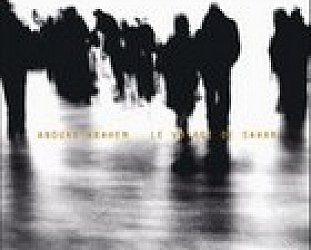Graham Reid | | 1 min read

The seemingly provocative title on this album isn't some retro-revisionism from within the damaged Politburo.
Rather it is New York/Barcelona-based ex-pat drummer/conceptualist Edward Ware – with soprano sax player Chris Kelsey – taking various fugues by the great Russian composer into that out-there world of jazz improv-cum-exploration.
And also out of the context of his period (the fugues were written in pre-Cold War but very icy 1950) and use the ideas, notes and passages as springboards into personal expression.
Kelsey brings a sometimes whimsical fleet-footedness to some of these pieces but also on the delightful Fugue #6 dials everything right back into a considered ballad before, through the agency of Ware's subtle drumming momentum, the pensive mood becomes more quietly joyful.
While it is easy to follow Kelsey's paths through these pieces as he seduces with melody (Fugue #8) or takes us towards Ornette Coleman's lively bouncing blues (Fugue #11), what always lies beneath is Ware's masterful understatement which rarely occupies the foreground but provides not just solid base for the melodies to sit on but suggests a percussive yet melodic element in its own right.
“Music, that most fluid of our arts,” writes Ware, “is a paradoxically emphatic and liberal conveyor of meaning, idea and culture. Just consider for a moment the startlingly disparate political and social ideologies to which the music of Wagner and Beethoven have famously been attached.
“As a composer living in communist Russia, Shostakovich (1906-1975) had to navigate an often shifting political context that could quickly impact the perceived meaning of his music.
“Symphonic writing by its nature, tends to the more public sphere and equally perhaps, the more intimate character of string quartet or piano music to the more personal.”
Like a two-hander play, Taking Shostakovich Out allows Ware and Kelsey to find their own characters in the musical opportunities the original pieces afford, notably on their extended interpretation of Shostakovich's enormously brooding and dramatic Prelude #14.
Here – among the 12 pieces, two of them alternate takes – is where we fully understand Ware's idea of taking established material and responding to it in this place and this time through different musical vehicles.
If you fancy a bright introduction start with the opening two fugues, if you want so much more then Prelude #14 is for you.
But don't miss Blackwell and Ornette-inda-house on Fugue #21
.
You can hear and buy this album at bandcamp here





post a comment